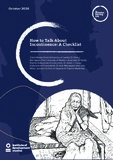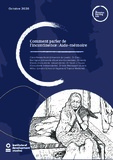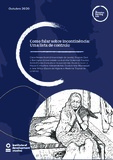How to Talk About Incontinence: A Checklist
Comment parler de l’incontinence : Aide-mémoire;
Como falar sobre incontinência: Uma lista de controlo
| dc.contributor.author | Rosato-Scott, Claire | |
| dc.contributor.author | Barrington, Dani J. | |
| dc.contributor.author | Bhakta, Amita | |
| dc.contributor.author | House, Sarah J. | |
| dc.contributor.author | Mactaggart, Islay | |
| dc.contributor.author | Wilbur, Jane | |
| dc.date.accessioned | 2020-10-21T15:40:12Z | |
| dc.date.available | 2020-10-21T15:40:12Z | |
| dc.date.issued | 2020-10-21 | |
| dc.identifier.citation | Rosato-Scott, C.; Barrington, D.J.; Bhakta, A., House, S.J.; Mactaggart, I. and Wilbur, J. (2020) How to Talk About Incontinence: A Checklist, The Sanitation Learning Hub Brighton: IDS, DOI: 10.19088/SLH.2020.006 | en |
| dc.identifier.citation | Rosato-Scott, C., Barrington, D.J., Bhakta, A., House, S.J., Mactaggart, I. et Wilbur, J. (2020) « Comment parler de l’incontinence : Aide-mémoire », The Sanitation Learning Hub, Brighton : IDS, DOI: 10.19088/SLH.2020.012 | fr |
| dc.identifier.citation | Rosato-Scott, C., Barrington, D.J., Bhakta, A., House, S.J., Mactaggart, I. e Wilbur, J. (2020) Como falar sobre incontinência: uma lista de controlo, The Sanitation Learning Hub, Brighton: IDS, DOI: 10.19088/SLH.2020.009 | pt |
| dc.identifier.isbn | 978-1-78118-708-1 | |
| dc.identifier.uri | https://opendocs.ids.ac.uk/opendocs/handle/20.500.12413/15729 | |
| dc.description.abstract | Incontinence is the medical term used to describe the involuntary loss of urine or faeces. Women, men, girls, boys and people of all genders, at any age, can experience incontinence. A person with incontinence can experience leakage occasionally, regularly or constantly; and leakage can happen at any time, day or night. A person may also experience leakage of urinary or faecal matter due to not being able to get to the toilet in time or not wanting to use the toilet facilities available. This is known as social, or functional, incontinence. In many low- and middle-income countries (LMICs) understanding of incontinence is still in its early stages: the term ‘incontinence’ may not be known, knowledge of the condition is rare, and the provision of support is lacking. Those who experience incontinence may face stigma due to having the condition, and this may affect their willingness or confidence to talk about it. There is a need to better understand incontinence in LMICs, and how best to support people living with the condition to improve their quality of life. This requires having conversations with individuals that experience the condition, and with individuals who care for those who do: they will have the lived experiences of what it means to live with incontinence practically, emotionally and socially for them and their families. Living with incontinence can have a range of impacts on the people living with it and their carers. These include increased stress and distress; additional needs for water and soap; and restricted ability to join in community activities, school or work. Living with incontinence can also lead to a range of protection issues. The potential challenges that people face may be quite diverse and may vary between people and households. The checklist below, and corresponding page references to ‘Incontinence: We Need to Talk About Leaks’ can be used to increase your understanding of incontinence and the options available to support people living with the condition; and provide guidance on how to have conversations to understand how best to support people living with incontinence in your area. | en |
| dc.description.abstract | Please also see the accompanying document: Incontinence: We Need to Talk About Leaks at https://opendocs.ids.ac.uk/opendocs/handle/20.500.12413/15728 | |
| dc.description.abstract | L’incontinence est le terme médical pour décrire la perte involontaire d’urine ou de matières fécales. Les femmes, les hommes, les filles et les garçons, quels que soient leur genre et leur âge, peuvent souffrir d’incontinence. Une personne qui souffre d’incontinence peut connaître des fuites occasionnelles, régulières ou constantes et les fuites peuvent survenir à tout moment du jour ou de la nuit. Une personne peut aussi subir des fuites urinaires ou fécales parce qu’elle n’est pas capable d’arriver aux toilettes à temps ou lorsqu’elle ne veut pas utiliser les toilettes à sa disposition. On parle alors d’incontinence sociale, ou fonctionnelle. Dans nombre de pays à revenu faible et intermédiaire (PRFI), l’incontinence est encore bien mal comprise : le terme même d’incontinence peut être ignoré, les connaissances sur cette pathologie sont encore rares et la fourniture d’un soutien fait défaut. Les personnes qui vivent avec l’incontinence peuvent être confrontées à une stigmatisation en raison de leur pathologie, de sorte qu’elles peuvent manquer de confiance et ne pas être disposées à en parler. Il est nécessaire de mieux comprendre l’incontinence dans les PRFI et la meilleure façon d’aider les personnes qui vivent avec cette pathologie afin d’améliorer leur qualité de vie. Cela nécessite d’échanger avec des individus qui en souffrent ainsi que leurs aidants : ces personnes sauront ce que cela veut dire que vivre avec l’incontinence d’un point de vue pratique, affectif et social pour elles et pour leur famille. Vivre avec l’incontinence peut avoir une foule de répercussions sur les personnes qui en souffrent et sur leurs aidants. Parmi celles-ci figurent un stress et une détresse accrus ; des besoins supplémentaires en eau et en savon ; moins de possibilités pour participer aux activités communautaires, fréquenter un établissement scolaire ou aller travailler. Vivre avec l’incontinence peut aussi entraîner différents risques d’abus et de violence. Les problèmes auxquels se heurtent les personnes qui souffrent d’incontinence peuvent être très divers et varier en fonction des personnes et des ménages. Cet aide-mémoire accompagne le guide intitulé « Incontinence : Il faut que nous parlions de fuites » (https://opendocs.ids.ac.uk/opendocs/handle/20.500.12413/15728). Utilisés ensemble, ils peuvent améliorer vos connaissances sur l’incontinence et les options à votre disposition pour aider les personnes qui vivent avec. En outre, ils vous donneront des conseils sur la manière d’échanger afin de comprendre comment aider au mieux les personnes qui vivent avec l’incontinence dans votre localité. | fr |
| dc.description.abstract | Cet aide-mémoire accompagne le guide intitulé « Incontinence : Il faut que nous parlions de fuites » (https://opendocs.ids.ac.uk/opendocs/handle/20.500.12413/15728). Utilisés ensemble, ils peuvent améliorer vos connaissances sur l’incontinence et les options à votre disposition pour aider les personnes qui vivent avec. En outre, ils vous donneront des conseils sur la manière d’échanger afin de comprendre comment aider au mieux les personnes qui vivent avec l’incontinence dans votre localité. | fr |
| dc.description.abstract | Incontinência é o termo médico usado para descrever as perdas involuntárias de urina ou de fezes. Mulheres, homens, raparigas, rapazes e pessoas de todos os sexos e em qualquer idade podem ter incontinência. Uma pessoa com incontinência pode ter perdas de urina ou de fezes esporádicas, regulares ou constantes; e essas perdas podem dar-se a qualquer hora, dia ou noite. Uma pessoa também pode ter perdas de matéria fecal ou urinária por não conseguir chegar a tempo à casa de banho ou por não querer usar as instalações sanitárias disponíveis. Chama-se a esse tipo de incontinência «incontinência social» ou «funcional». Em muitos Países de Baixo e Médio Rendimento (PBMR), o conhecimento da incontinência está ainda na sua fase inicial: o termo «incontinência» pode ser desconhecido, o conhecimento deste estado clínico é raro e há falta de apoio. As pessoas que têm incontinência podem ser estigmatizadas por causa disso, o que pode afectar a sua vontade ou confiança para falar sobre esta questão. É preciso compreender melhor a incontinência nos PBMR e qual a melhor forma de apoiar as pessoas que vivem com ela, para melhorar a sua qualidade de vida. Isto exige conversar com indivíduos que têm incontinência e com quem cuida deles: essas pessoas têm a experiência concreta do que significa viver com a incontinência do ponto de vista prático, emocional e social, para elas próprias e para as suas famílias. A incontinência pode ter uma série de impactos sobre as pessoas que vivem com ela e sobre os seus cuidadores. Estes impactos são o aumento do stress e da angústia; maior necessidade de água e sabão; e pouca capacidade de participar em actividades comunitárias, escolares ou laborais. Viver com incontinência também pode levar a uma série de questões de protecção. Os desafios que as pessoas podem enfrentam são bastante diversos e podem variar de pessoa para pessoa e de lar para lar. A lista de controlo que se segue e as respectivas referências às páginas de “Precisamos de falar sobre incontinência” podem ser usadas para aumentar os seus conhecimentos sobre incontinência e sobre as opções disponíveis para apoiar as pessoas que vivem com ela, e dar orientações sobre como ter conversas para compreender a melhor maneira de apoiar as pessoas que vivem com incontinência na sua zona. | pt |
| dc.description.abstract | Esta lista de controlo acompanha o guia “Precisamos de falar sobre incontinência” (https://opendocs.ids.ac.uk/opendocs/handle/20.500.12413/15728) – usados em conjunto, estes dois documentos podem aumentar os seus conhecimentos sobre incontinência e sobre as opções disponíveis para apoiar as pessoas que vivem com ela, e dar orientações sobre como ter conversas para compreender a melhor maneira de apoiar as pessoas que vivem com incontinência na sua zona. | pt |
| dc.description.sponsorship | Funded by the Swedish International Development Cooperation (Sida). | en |
| dc.language.iso | en | en |
| dc.publisher | Institute of Development Studies | en |
| dc.rights | This pubication is licensed under the Creative Commons Attribution-Non-Commercial-NoDerivs 3.0 Unported License (https://creativecommons.org/licenses/by-nc-nd/3.0/). Attribution: You must attribute the work in the manner specified by the author or licensor. Non-commercial: You may not use this work for commercial purposes No Derivative Works: You may not alter, transfer, or build on this work. Users are welcome to copy, distribute, display, translate or perform this work without written permission. For any reuse or distribution, you must make clear to others the licence terms of this work. If you use the work, we ask that you reference the SLH website (https://sanitationlearninghub.org/) and send a copy of the work or a link to its use online to the following address: The Sanitation Learning Hub, Institute of Development Studies, University of Sussex, Brighton, BN1 9RE, UK (SLH@ids.ac.uk). | en |
| dc.rights.uri | http://creativecommons.org/licenses/by-nc-nd/3.0/ | en |
| dc.subject | Health | en |
| dc.subject | Participation | en |
| dc.title | How to Talk About Incontinence: A Checklist | en |
| dc.title | Comment parler de l’incontinence : Aide-mémoire | fr |
| dc.title | Como falar sobre incontinência: Uma lista de controlo | pt |
| dc.type | Series paper (non-IDS) | en |
| dc.rights.holder | Institute of Development Studies | en |
| dc.identifier.externaluri | https://sanitationlearninghub.org/resource/how-to-talk-about-incontinence-a-checklist/ | en |
| dc.identifier.externaluri | https://opendocs.ids.ac.uk/opendocs/handle/20.500.12413/15728 | |
| dc.identifier.team | Participation | en |
| dc.identifier.doi | 10.19088/SLH.2020.006 | |
| dc.identifier.doi | 10.19088/SLH.2020.012 | |
| dc.identifier.doi | 10.19088/SLH.2020.009 | |
| dcterms.dateAccepted | 2020-10-21 | |
| rioxxterms.funder | Default funder | en |
| rioxxterms.identifier.project | The Sanitation Learning Hub | en |
| rioxxterms.version | AO | en |
| rioxxterms.funder.project | 44cbea9c-3179-456c-bc3f-9b7cd4f89d0d | en |
Files in this item
This item appears in the following Collection(s)
Except where otherwise noted, this item's license is described as This pubication is licensed under the Creative Commons Attribution-Non-Commercial-NoDerivs 3.0 Unported License
(https://creativecommons.org/licenses/by-nc-nd/3.0/).
Attribution: You must attribute the work in the manner specified by the author or licensor.
Non-commercial: You may not use this work for commercial purposes
No Derivative Works: You may not alter, transfer, or build on this work.
Users are welcome to copy, distribute, display, translate or perform this work without written permission. For any reuse or distribution, you must make clear to others the licence terms of this work. If you use the work, we ask that you reference the SLH website (https://sanitationlearninghub.org/) and send a copy of the work or a link to its use online to the following address: The Sanitation Learning Hub, Institute of Development Studies, University of Sussex, Brighton, BN1 9RE, UK (SLH@ids.ac.uk).




